Related Research Articles

The Te Deum in C major, WAB 45, is a setting of the Te Deum hymn, composed by Anton Bruckner for SATB choir and soloists, orchestra, and organ ad libitum.
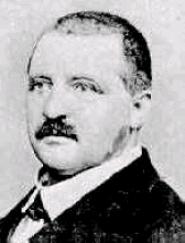
The Mass No. 3 in F minor, WAB 28, is a setting of the mass ordinary for vocal soloists, chorus and orchestra, and organ ad libitum, that Anton Bruckner composed in 1867–1868.
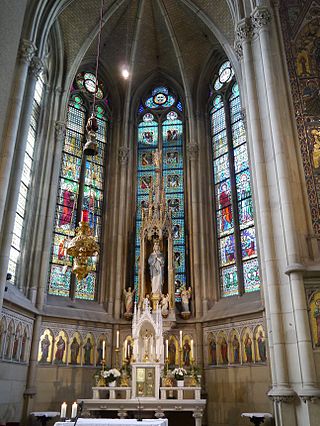
The Mass No. 2 in E minor, WAB 27 is a setting of the mass ordinary for eight-part mixed choir and fifteen wind instruments, that Anton Bruckner composed in 1866.
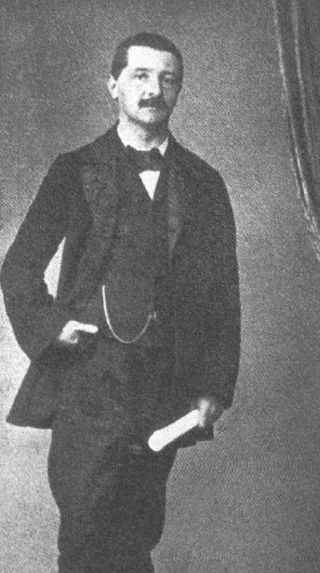
The Requiem in D minor, WAB 39, is a Missa pro defunctis composed by Anton Bruckner in 1849.

Anton Bruckner's Psalm 150, WAB 38, is a setting of Psalm 150 for mixed chorus, soprano soloist and orchestra written in 1892.

Bruckner's Psalm 114, WAB 36, is a psalm setting of verses 1 to 9 of a German version of Psalm 116, which is Psalm 114 in the Vulgata.

Bruckner's Psalm 112, WAB 35, is a psalm setting for eight-part double mixed choir and full orchestra. It is a setting of a German version of Psalm 113, which is Psalm 112 in the Vulgata.

The Mass No. 1 in D minor, WAB 26 by Anton Bruckner, is a setting of the Mass ordinary for soloists, mixed choir and orchestra, and organ.

Ecce sacerdos magnus, WAB 13, is an 1885 sacred motet by the Austrian composer Anton Bruckner. It is a musical setting of the antiphon of the same title.
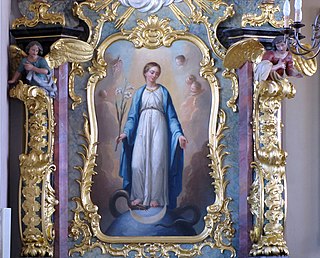
Virga Jesse, WAB 52, is a motet by the Austrian composer Anton Bruckner. It sets the gradual Virga Jesse floruit for unaccompanied mixed choir.

Vexilla regis, WAB 51, is the final motet written by the Austrian composer Anton Bruckner.

Locus iste, WAB 23, is a sacred motet composed by Anton Bruckner in 1869. The text is the Latin gradual Locus iste for the annual celebration of a church's dedication. The incipit, Locus iste a Deo factus est, translates to "This place was made by God". Bruckner set it for four unaccompanied voices, intended for the dedication of the Votivkapelle at the New Cathedral in Linz, Austria, where Bruckner had been a cathedral organist. It was the first motet that Bruckner composed in Vienna. It was published in 1886, together with three other gradual motets.
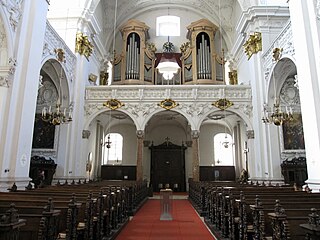
Ave Maria, WAB 6, is a sacred motet by Anton Bruckner, a setting of the Latin prayer Ave Maria. He composed it in Linz in 1861 and scored the short work in F major for seven unaccompanied voices. The piece, sometimes named an Offertorium, was published in Vienna in 1867. Before, Bruckner composed the same prayer in 1856 for soprano, alto, a four-part mixed choir, organ and cello, WAB 5. Later, he set the text in 1882 for a solo voice (alto) and keyboard, WAB 7.

Christus factus est, WAB 11, is a sacred motet by Anton Bruckner, his third setting of the Latin gradual Christus factus est, composed in 1884. Before, Bruckner composed in 1844 a first piece on the same text as gradual of the Messe für den Gründonnerstag, and in 1873 a motet for eight-part mixed choir, three trombones, and string instruments ad libitum. The motet is an expressive setting of the gradual, influenced by Wagner's music.

Os justi, WAB 30, is a sacred motet composed by Anton Bruckner in 1879. Os Justi is a Gregorian chant used as gradual of the Commune Doctorum, and as introit I and gradual II of the Commune Confessoris non Pontificis.

Libera me, WAB 21, is the first of two settings of the absoute Libera me, composed by Anton Bruckner in c. 1843.

Libera me, WAB 22, is the second of two settings of the absoute Libera me, composed by Anton Bruckner in 1854.

The Two Aequali, WAB 114 & WAB 149, were composed by Anton Bruckner in 1847.

Salvum fac populum tuum, WAB 40, is a motet composed by Anton Bruckner in 1884.
References
- ↑ "David McKie: Sing if you're winning". The Guardian . 21 March 2002. Retrieved 9 August 2020.
- ↑ "Vokalmusik / Vocal and choral works | Diskografie von Anton Bruckner". Abruckner.com. Retrieved 9 August 2020.
- ↑ "Requiem d-Moll, WAB 39 (1849) | Diskografie von Anton Bruckner". Abruckner.com. Retrieved 9 August 2020.
- ↑ "Messe Nr. 2 e-Moll, WAB 27 (1866, 1882) | Diskografie von Anton Bruckner". Abruckner.com. Retrieved 9 August 2020.
- ↑ "Psalm 114 (116) G-Dur, WAB 36 (1852) "Alleluja! Liebe erfüllt mich" | Diskografie von Anton Bruckner". Abruckner.com. Retrieved 9 August 2020.
- ↑ "Psalm 112 B-Dur (WAB 35) 1863 "Alleluja! Lobet den Herrn, ihr Diener" | Diskografie von Anton Bruckner". Abruckner.com. Retrieved 9 August 2020.
- ↑ "Messe Nr. 1 d-Moll, WAB 26 (1864) | Diskografie von Anton Bruckner". Abruckner.com. Retrieved 9 August 2020.
- ↑ "Messe Nr. 3 f-Moll (WAB 28) 1868 | Diskografie von Anton Bruckner". Abruckner.com. Retrieved 9 August 2020.
- ↑ "Zwei Aequale c-Moll für 3 Posaunen, WAB 114 + 149 (1847) | Diskografie von Anton Bruckner". Abruckner.com. Retrieved 9 August 2020.
- ↑ "Libera me f-Moll, WAB 22 (1854) | Diskografie von Anton Bruckner". Abruckner.com. Retrieved 9 August 2020.
- ↑ "Te Deum C-Dur, WAB 45 | Diskografie von Anton Bruckner". Abruckner.com. Retrieved 9 August 2020.
- ↑ "Psalm 150 C-Dur, WAB 38 (1892) "Halleluja! Lobet den Herrn in seinem Heiligtum" | Diskografie von Anton Bruckner". Abruckner.com. Retrieved 9 August 2020.